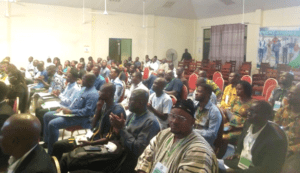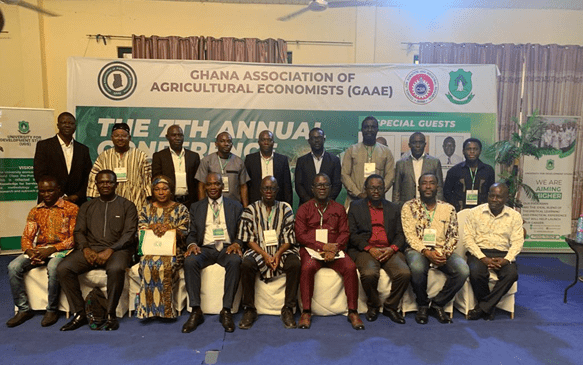By Samuel SAM
Vice Chancellor-University for Development Studies (UDS), Prof. Seidu Al-Hassan, has called for stricter policies to combat illegal mining – warning that the practice threatens food security and the nation’s overall development.
“The continued engagement in illegal mining, known as galamsey, along the country’s water-bodies and forests threatens our natural resources. This not only undermines the agricultural sector but also jeopardises environmental sustainability,” he said.
Prof. Seidu Al-Hassan, represented by Pro-Vice Chancellor Prof. Elliot Alhassan, made this call during the Ghana Association of Agricultural Economists’ (GAAE) seventh Annual Conference, held at the University for Development Studies (UDS) main campus in the Sagnarigu municipality of Northern Region.
The four-day event, dubbed ‘Regenerative and precision agriculture for inclusive value chain development in Africa’, focused on developing actionable policies that address challenges faced by the agricultural sector.

It brought together leading agricultural economists, researchers, policymakers and industry professionals from across the country to address critical issues affecting the agricultural sector in Ghana and beyond.
It was also to share state-of-the-art research findings and innovative practices to promote farming methods that improve land management and resource use.
He urged the Association to help develop policies that address issues affecting agriculture and the economy with their expertise .
He reiterated the university community’s commitment to identifying issues of national interest for swift response.
Northern Regional Director of Agriculture, Hajia Hawa Musah – represented by Madam Rahmat Musah, Northern Regional Agriculture Engineer, encouraged GAAE
to produce research that helps address the impact of climate change that’s affecting agriculture.
She stressed that agriculture, as the backbone of Ghana’s economy, is under threat due to the changing weather patterns; and solutions must be found to safeguard millions of farmers’ livelihoods.
“The time for talking is over. We need practical, research-backed recommendations to fight climate change and protect our agricultural systems,” she added.
President-GAAE, Professor Daniel Bruce Sarpong, extended a warm welcome to participants.
He emphasised the conference’s importance as a platform for exchanging ideas and forging solutions to challenges facing Ghana’s agriculture, saying: “I urge all participants to actively contribute in the discussions. Your insights can drive meaningful change and positively impact society”.
Professor Sarpong encouraged attendees to focus on actionable outcomes that can help shape policy and practice in agricultural economics.
“GAAE, through its annual conferences, seeks to foster collaboration among stakeholders in the agricultural sector to share ideas on ways to contribute in the development of effective strategies for the country’s agricultural sector,” he said.
According to him, bringing experts together will help drive innovation and influence policy to improve agricultural productivity and economic growth in Ghana
“We are committed to promoting the development of agriculture by facilitating research and policy dialogue on critical issues such as food security, sustainable farming and rural development,” he added.
“Throughout the event, contributors engaged in plenary and breakout sessions where they presented and discussed research findings while offering valuable insights into key areas such as agricultural finance, climate resilience and food systems,” he explained.










